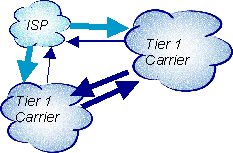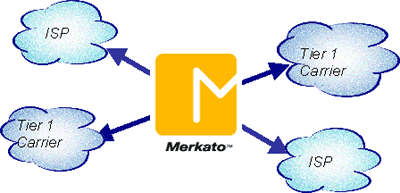|

The global Internet is a collection of thousands of inter-connected networks. Each Internet Service Provider (ISP) must connect to other ISPs to ensure that the traffic from its customers can reach its destination at any other ISP.
Traditionally, ISP inter-connections were made according to a free peering model, on the assumption that exchanged traffic  was more or less equal in both directions between any two ISPs. In this model, each ISP is responsible for establishing a physical connection to one or more peering points. Ideally, all carriers and ISPs should be able to exchange traffic at peering points where many other service providers are present. This allows data to travel to the destination using the best possible path. was more or less equal in both directions between any two ISPs. In this model, each ISP is responsible for establishing a physical connection to one or more peering points. Ideally, all carriers and ISPs should be able to exchange traffic at peering points where many other service providers are present. This allows data to travel to the destination using the best possible path.
Today, there are many more regional and smaller service providers and ISPs looking to exchange traffic with Tier 1 Carriers. The smaller service providers and ISPs have large volumes of traffic to push through Tier 1 Carriers' networks; however, Tier 1 Carriers do not have a lot of traffic for the small service providers. The reality is that a small (regional or local) ISP needs a Tier 1 Carrier more than vice-versa. IP Transit relates to paying for relatively unequal traffic exchanges whereby one ISP pays another for carriage of traffic via its network.
This crude dichotomy results in market inefficiencies equivalent to unrealized revenue for the seller and unrealized savings for the buyers. The fundamental issue is the lack of a sustainable economic model to go along with the architectural advantages of inter-ISP peering.
-
IP transit costly for small service providers and ISPs
-
Arbitrary, non-market based fees, no price transparency
-
Peering fees due to unbalanced traffic exchanges
-
Lack of dynamic terms
-
Lower quality, congested paths to final destination
InvisibleHand provides a sustainable economic model for ISP interconnection by creating a real-time and dynamic marketplace with the Merkato platform.

With dynamic market pricing of capacity at exchanges peering can be charged appropriately based on need or demand and transparently, covering the whole range of relationships dynamically rather than forcing all contracts into either an equal peer arrangement or a simple customer-vendor relationship.
-
Optimizes revenue for sellers; provides savings and greater flexibility for buyers
-
Apportions traffic to appropriate autonomous system’s in real-time for optimal price/performance trade off
-
Helps to eliminate least cost routing bottlenecks
-
Provides economically sound peering connections
-
Facilitates inter-provider deployment of new service classes
|
